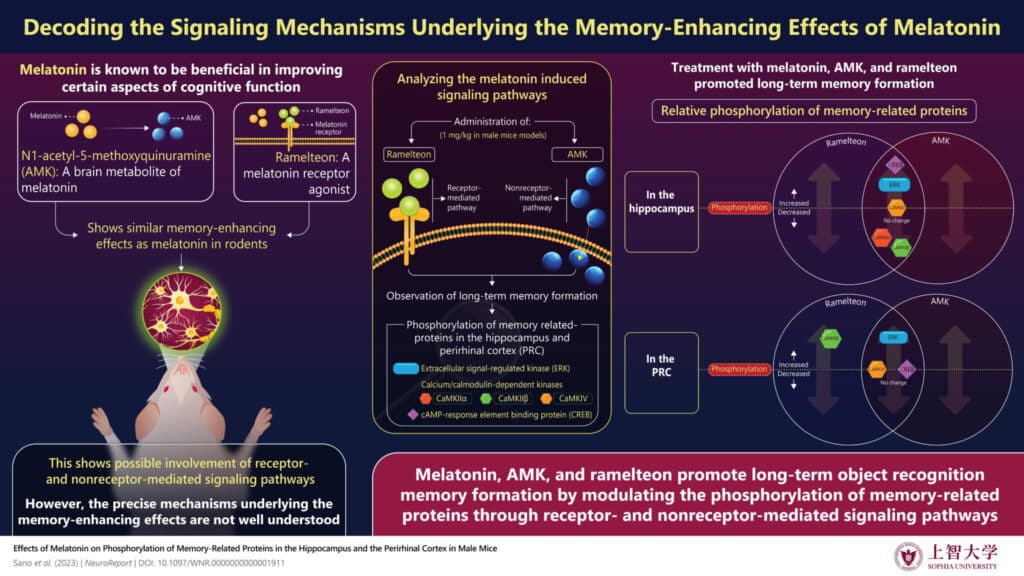A well-known memory booster is melatonin, secreted by the pineal gland. The phosphorylation status of essential memory-related proteins has been linked to short- and long-term memory formation. Still, the molecular mechanisms underpinning melatonin-induced memory enhancement have remained a mystery.
Using male mouse models, medical researchers from Sophia University in Japan have discovered that will help elucidate several molecular pathways controlling the stimulation of long-term object recognition memory formation by melatonin.
The study aims to determine the effects of melatonin, ramelteon, and N1-acetyl-5-methoxyquinuramine on the relative phosphorylation levels of memory-related proteins. Scientists wanted to explore candidate signaling pathways associated with the receptor- and nonreceptor-mediated memory-enhancing effects of melatonin.
To do so, scientists examined the effects of three compounds on memory formation: melatonin, N1-acetyl-5-methoxyquinuramine (AMK) melatonin’s biological metabolite, and ramelteon, a drug that binds and activates the melatonin receptor.
They also examined phosphorylation in five critical proteins in memory formation or the biochemical addition of phosphate groups to protein structures. These included the cAMP-response element binding protein (CREB), the protein extracellular signal-regulated kinase (ERK), calcium/calmodulin-dependent kinase II (CaMKII), CaMKII, and CaMKIV.
Initial research on male mice showed unequivocally that the injection of melatonin, ramelteon, or AMK at 1 mg/kg aided the development of long-term memory. To prevent any potential data fluctuation brought on by the reproductive cycles of female mammals, the researchers did not examine the effects of the three chemicals on female mice.

The novel objection recognition task, also known as “NORT,” was used in a series of tests to measure long-term memory development in male mice. In this study, laboratory mice were exposed to an experimental setting for three days, five minutes each day.
Two identical objects were positioned in the testing area on the fourth day, and mice were free to investigate them for five minutes (training phase). The male mice were put to the test 24 hours following the end of the training period. One of the two recognizable objects was swapped out for a brand-new or unknown one throughout the testing phase. A skilled observer recorded how much time the mice spent investigating each object, which indicates object recognition memory. It is well known that mice prefer to explore new objects and spend less time around familiar ones.
Following conventional procedures for animal sacrifice, the researchers examined the effects of ramelteon and AMK on the phosphorylation of ERK, CaMKII, CaMKII, CaMKIV, and CREB in the male mouse brain. Treatment with ramelteon/AMK markedly raised the phosphorylation of both ERK and CREB in the hippocampus, the learning and memory center of the mammalian brain.
However, these medications markedly reduced CaMKII/phosphorylation in the same brain region. Both ramelteon and AMK considerably raised ERK in the perirhinal cortex (PRC), which is similarly involved in memory processes, but only ramelteon significantly increased CaMKII phosphorylation. Ramelteon/AMK did not impact CaMKIV’s phosphorylation in the hippocampus/PRC.
Lead author Professor Atsuhiko Chiba from the Department of Materials and Life Sciences, Faculty of Science and Technology, Sophia University, says, “Our findings suggest that melatonin is involved in promoting the formation of long-term object recognition memory by modulating the phosphorylation levels of memory-related proteins such as ERK, CaMKIIs, and CREB in both receptor-mediated and nonreceptor-mediated signaling pathways.”
Journal Reference:
- Masahiro Sano, Hikaru Iwashita, Chihiro Suzuki, Mari Kawaguchi, and Atsuhiko Chiba. Effects of Melatonin on Phosphorylation of Memory-Related Proteins in the Hippocampus and the Perirhinal Cortex in Male Mice. NeuroReport. DOI: 10.1097/wnr.0000000000001911
